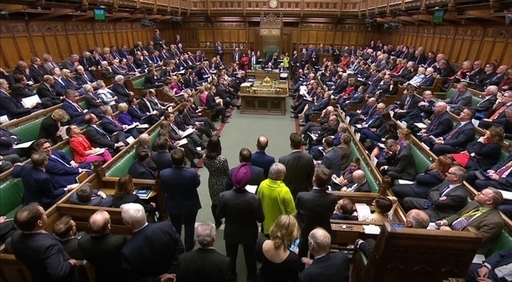Why is the British bulldog proving so bloody obstinate? The question must perplex the entire European Union, which thinks it has put an entirely reasonable deal on the table that the United Kingdom refuses to pick up. And there is a lot to be said for that view. Theresa May's latest and possible last effort to get her withdrawal agreement past the House of Commons included her offer to resign as prime minister so someone else could preside over the next stage of the UK-EU relationship; and the separation of her agreement from its associated political declaration, so MPs could vote for the one without the other.
But it still wasn't nearly enough. The long Brexit debates have clarified Parliamentary minds to the extent that it is clear the withdrawal agreement was not the problem, save for the Irish backstop which was only for use in emergencies. The problem was the political declaration, which attempted to sketch out some of the options ahead. It was thin on substance, and beyond the usual platitudes, thinner still on firm principles. It looked as if the negotiators had put all their skill and energy into the withdrawal agreement, and it was by many accounts a first class piece of work.
If Britain was to leave the EU, it would be this way. The really contentious issues were all within the scope of the political declaration - the plan for the future. That was where Mrs May had etched her uncrossable red lines, on the control of UK's borders, the control of UK's trade deals and the control of UK laws. But is wasn't enough to satisfy the Tory anti-EU hard core on the one hand, and it went too far to satisfy the majority of pro-EU pragmatists on the other side. Many of them were in her Cabinet or serving as junior ministers or among her backbenchers.
What is it, exactly, that drives the Eurosceptic bus? It is an exceedingly difficult question to answer, from whatever perspective one comes at it. Let me try to answer it by being subjective. Not very many pro-Europeans, among whom I count myself, are 100 per cent for the EU project. I would describe myself as 60-40, and if I had had a hundred votes in the 2016 referendum that is how I would have divided them. I do not think I am unusual. That minority part of me which is sympathetic to the Eurosceptic case feels or senses it rather than understands it fully. It is not entirely about sovereignty, at least not for its own sake.
It is an intuition that what one might call the British project, whose history has a trajectory over the last three centuries at least, is at the same time both very precious but also very precarious. It consists of delicate balances, often not written down, often half conscious.
Take such British traits as the forming of an orderly queue at a bus stop or train station. Nobody enforces it. The rules are unwritten. Foreigners often describe it as the thing that strikes them most after a visit to Britain.
Take, again, the strange behaviour of the British when someone bumps into them in the street. The bumped apologises to the bumper - if one might so describe him or her - who then apologises back. It defuses the potential for aggression as nothing else could. It is an expression of power. Foreigners are often amazed by this trait. They mistake it for weakness.
But the whole of British life is like this, a set of learnt rules, habits and nuances that are unconsciously ingrained in the culture. Other cultures do things differently, and enforce their rules differently. They have written constitutions, and the British do not. That is where the sense of precariousness comes from. The British are secretly afraid that people from outside the British project could easily destabilise it - certainly without meaning to - because they do not understand it.
The whole thing could come crashing down. And yet the British are proud of it, and believe the British alliance of laws, values and conventions have made for a great achievement, one of the world's best examples of a modern civilisation that leaves space for human beings to be themselves and to conduct the relations between them in a way that is decent and humane. And good natured. And often downright humorous. A world of Faulty Towers and Monty Python. A world where battles, like games of cricket, stop for tea.
The British constitution, for example, has many paradoxes and illogicalities. For instance judges are appointed by the Crown and sit in the name of the Crown, prosecutions are also brought in the name of the Crown, and the laws they uphold are the Crown's laws. Yet nobody sees this as a conflict of interest. There are subtle differences between the Crown as the judge's employer, the Crown as source of justice in court, the Crown as presenter of the case for the prosecution, and the Crown as ultimate law maker. There are boundaries between these roles that are policed almost unconsciously. The Queen herself, incidentally, has almost nothing to do with it. Except she also understands the rules.
In American courts a lawyer who wants to complain about a question being asked by his opponent, jumps to his feet and shouts "Objection!" In British courts in a similar situation counsel will languidly rise from a sitting position, bottom scarcely clearing the bench, and clear his throat. Good manners are what lubricate British formal and informal relations, and good manners are caught not taught. The British personality is formed not on the playing fields of Eton but in a bus queue. Manners maketh the man. Politeness is next to godliness.
Does all this breed an unspoken sense of superiority? A belief that foreigners must not be allowed too much say over how we live our lives lest they crush its petals? That the British are somehow the very best? Yes it does - but it would be the absolute height of bad manners to say so.
CLIFFORD LONGLEY'S BREXIT WATCH:
Clifford Longley will be writing regular updates on Brexit over the coming weeks. To read more click on the links below.
Dark days in Brexit land
If a 'no deal' Brexit is ruled out, what next?
Revocation of Brexit on the horizon?
Could Brexit now be abandoned altogether?
Did May fundamentally misunderstand the Brexit referendum result?
What the Conservative Party really needs is a shift to the left
Is the collective of IQ of the House of Commons that of an 11-year-old?



 Loading ...
Loading ...
What do you think?
You can post as a subscriber user ...
User comments (0)